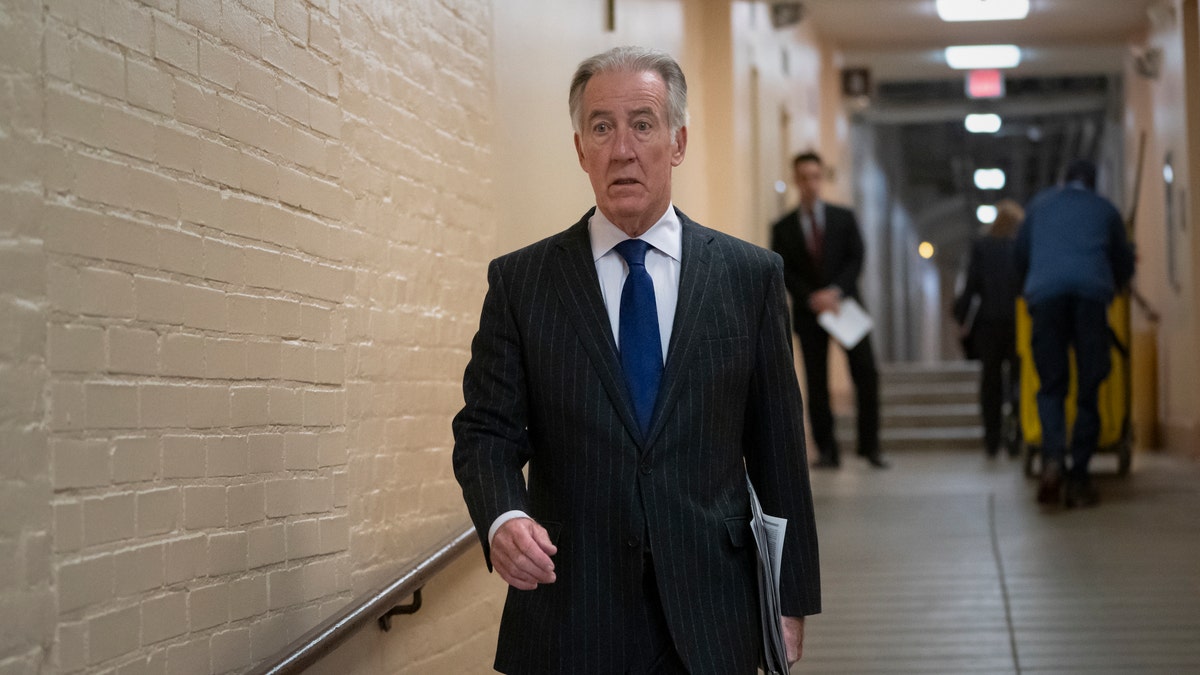Exclusive: Mick Mulvaney on President Trump's border security push, growing tensions with House Democrats
President Trump warns Mexico to stop the flow of migrants and drugs to the U.S.; insight from White House chief of staff Mick Mulvaney.
Acting White House Chief of Staff Mick Mulvaney told "Fox News Sunday" in an exclusive interview that Democrats will "never" see President Trump's tax returns, days after a House Democrat committee chairman made the unprecedented demand that the IRS provide the documents.
Mulvaney's comments marked an apparent escalation in the White House's rhetoric on the issue. On Wednesday, Trump responded with a dismissive taunt to Democrats' renewed push for his tax information, but suggested he might be willing to provide the information pending the conclusion of an audit.
"Oh no, never -- nor should they," Mulvaney told Bill Hemmer, who is filling in for host Chris Wallace, when asked if Democrats will ever see the president's tax returns. "That’s an issue that was already litigated during the election. Voters knew the president could have given his tax returns. They knew that he didn’t and they elected him anyway."
Mulvaney added that Democrats "know" they won't get the returns, and "just want attention on the issue because they don’t want to talk to us about policy." A "fundamental" purpose of tax law, Mulvaney continued, is to protect the privacy of tax filers.
"If they don't get what they want in the Mueller report, they're going to ask for the taxes," Mulvaney said. "If they don't get what they want in the taxes, they're going to ask for something else. It doesn't surprise anybody."

House Ways and Means Committee Chairman Richard Neal, D-Mass., arrives for a Democratic Caucus meeting at the Capitol in Washington, on April 2, 2019. Rep. Neal, whose committee has jurisdiction over all tax issues, has formally requested President Donald Trump's tax returns from the Internal Revenue Service for the past 6 years. (AP Photo/J. Scott Applewhite)
Told by a reporter on Wednesday at the White House that Democrats wanted six years of his tax returns, Trump didn't rule out the possibility permanently.
"Is that all? Usually it's 10," Trump responded. "So I guess they're giving up. We're under audit, despite what people said, and we're working that out -- I'm always under audit, it seems, but I've been under audit for many years, because the numbers are big, and I guess when you have a name, you're audited. But until such time as I'm not under audit, I would not be inclined to do that."
One of the president's personal lawyers later wrote a forceful four-page letter to the Treasury Department to oppose the Democrats' request, saying it would set a "dangerous precedent."
WHAT DID TRUMP ATTORNEY SAY IN LETTER OPPOSING DEMS' TAX RETURN DEMAND?
The request Wednesday by Massachusetts Rep. Richard Neal, who heads the tax-writing House Ways and Means Committee, was the first such demand for a sitting president's tax information in 45 years. The move set up a virtually certain legal showdown with the White House.
Neal made the request in a letter to IRS Commissioner Charles Rettig, asking for Trump's personal and business returns for 2013 through 2018. Neal told Rettig that Democrats have a duty "to ensure that the Internal Revenue Service is enforcing the laws in a fair and impartial manner."
“It is critical to ensure the accountability of our government and elected officials," Neal said in a statement. "To maintain trust in our democracy, the American people must be assured that their government is operating properly, as laws intend."
Neal specifically demanded the federal income tax returns from eight entities, including Trump National Golf Club-Bedminster, as well as statements specifying whether the returns were ever under audit. Neal also demanded all administrative files, including affidavits, related to each return.
Also on Sunday, Ways and Means committee member Dan Kildee, D-Mich., backed up Neal's request.
"It is not up to President Trump to determine whether or not this coequal branch of government has the tools available to it to make the deliberations necessary in order to make policy," Kildee told ABC News' "This Week" on Sunday.
And speaking later to Hemmer, Rep. Ben Ray Luján, D-N.M., said that Trump had promised to release his tax returns during the 2016 presidential campaign.
"This is not political," Luján insisted.
The president's congressional allies registered immediate and fierce disapproval to Neal's request throughout the week. The top Republican on the House Ways and Means Committee, Kevin Brady, R-Texas, wrote to Treasury Secretary Steven Mnuchin to decry what he called Democrats' "abuse" of their authority.
“Weaponizing our nation’s tax code by targeting political foes sets a dangerous precedent and weakens Americans' privacy rights, As you know, by law all Americans have a fundamental right to the privacy of the personal information found in their tax returns," Brady said in the letter. “This particular request is an abuse of the tax-writing committees’ statutory authority, and violates the intent and safeguards of Section 6103 of the Internal Revenue Code as Congress intended.”
That provision of tax law generally prohibits the disclosure of personal tax information.
Brady wrote that while "transparency in our government is enormously important," the "privacy and freedom" of all taxpayers is paramount -- and that Congress should pass new disclosure laws if it sees a problem. Violating the privacy rights of one taxpayer, Brady asserted, "begins the process of eroding and threatening the privacy rights of all taxpayers."

FILE - In this Dec. 10, 2018, file photo, people look on from the Mexican side, left, as U.S. Border Patrol agents on the other side of the U.S. border wall in San Diego prepare for the arrival of hundreds of pro-migration protestors, seen from Tijuana, Mexico. The southern border is nearly 2,000 miles long and already has about 650 miles of different types of barriers, including short vehicle barricades and tall, steel fences that go up to 30 feet high. (AP Photo/Rebecca Blackwell, File)
Mulvaney, on Sunday, echoed those concerns.
"They know one of the fundamental principles of the IRS is to protect the confidentiality of you and me and everybody else who files taxes. They know that," Mulvaney said. "They know the terms under law by which the IRS can give them the documents, but political hit job is not one of those reasons."
Separately, Mulvaney charged that Democrats suffer from "Trump Derangement Syndrome" and were "blindsided" by Special Counsel Robert Mueller's findings that the Trump team had not colluded illegally with Russia.
Mulvaney also sounded a critical note on the 2020 Democrat presidential field, telling Hemmer "it's fun watching them implode," and that the party's leading candidates seem to want to "Make America Apologize Again" on an array of issues.
And asked whether Herman Cain is still up for a position on the Federal Reserve board despite longstanding sexual harassment allegations against him, Mulvaney responded, "Yes, and I think Herman would be a great member of the Fed."
Fox News' Bill Hemmer, Mike Emanuel, Chad Pergram and The Associated Press contributed to this report.





















